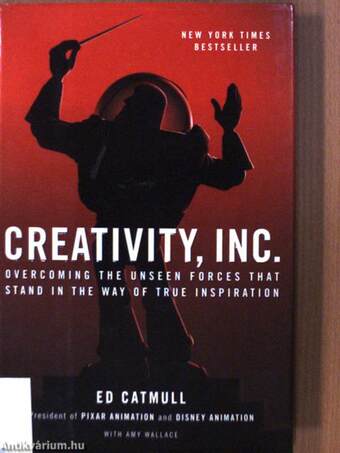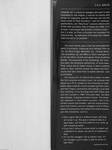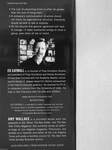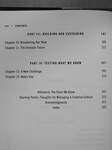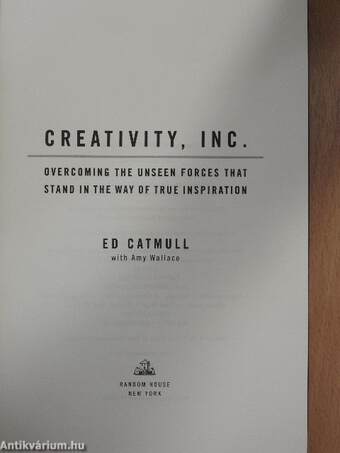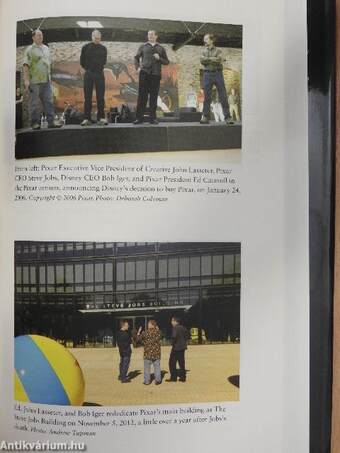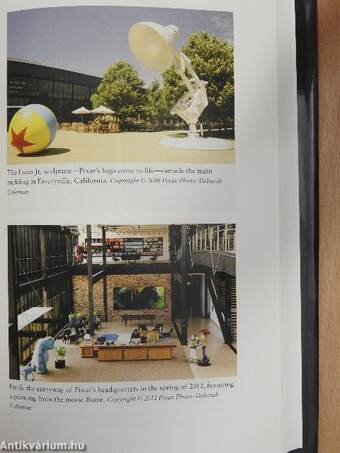1.069.408
kiadvánnyal nyújtjuk Magyarország legnagyobb antikvár könyv-kínálatát

VISSZA
A TETEJÉRE
JAVASLATOKÉszre-
vételek
Creativity, Inc.
Overcoming the Unseen Forces that Stand in the Way of True Inspiration
| Kiadó: | Random House |
|---|---|
| Kiadás helye: | New York |
| Kiadás éve: | |
| Kötés típusa: | Ragasztott kemény papírkötés |
| Oldalszám: | 340 oldal |
| Sorozatcím: | |
| Kötetszám: | |
| Nyelv: | Angol |
| Méret: | 24 cm x 16 cm |
| ISBN: | 978-0-8129-9301-1 |
| Megjegyzés: | Néhány színes fotóval. |
naponta értesítjük a beérkező friss
kiadványokról
naponta értesítjük a beérkező friss
kiadványokról
Fülszöveg
U.S.A. $28.00
Creativity, Inc. is a book for managers who want to lead employees to new heights, a manual for anyone who strives for originality, and the first-ever trip into the nerve center of Pixar Animation—into the meetings, postmortems, and "Braintrust" sessions where somé of the most successful films in history are made. It is, at heart, a book about how to build a creative culture— but it is alsó, as Pixar co-founder and president Ed Catmull writes, "an expression of the ideas that I believe make the best in us possible."
For nearly twenty years, Pixar has dominated the world of animation, producing such beloved films as the Toy Story trilogy, Monsters, Inc., Finding Nemo, The incredibles, Up, and WALL-E, which have gone on to set box-office records and garner thirty Academy Awards. The joyousness of the storytelling, the inven-tive plots, the emotional authenticity: In somé ways, Pixar movies are an object lesson in what creativity really is. Here, Catmull reveals the... Tovább
Fülszöveg
U.S.A. $28.00
Creativity, Inc. is a book for managers who want to lead employees to new heights, a manual for anyone who strives for originality, and the first-ever trip into the nerve center of Pixar Animation—into the meetings, postmortems, and "Braintrust" sessions where somé of the most successful films in history are made. It is, at heart, a book about how to build a creative culture— but it is alsó, as Pixar co-founder and president Ed Catmull writes, "an expression of the ideas that I believe make the best in us possible."
For nearly twenty years, Pixar has dominated the world of animation, producing such beloved films as the Toy Story trilogy, Monsters, Inc., Finding Nemo, The incredibles, Up, and WALL-E, which have gone on to set box-office records and garner thirty Academy Awards. The joyousness of the storytelling, the inven-tive plots, the emotional authenticity: In somé ways, Pixar movies are an object lesson in what creativity really is. Here, Catmull reveals the ideals and tech-niques that have made Pixar so widely admired—and so profitable.
As a young man, Ed Catmull had a dream: to make the first computer-animated movie. He nurtured that dream as a Ph.D. student at the University of Utah, where many computer science pioneers got their start, and then forged a partnership with George Lucas that led, indirectly, to his founding Pixar with Steve Jobs and John Lasseter in 1986. Nine years later, Toy Story was released, changing animation forever. The essen-tial ingredient in that movie's success—and in the thirteen movies that followed—was the unique environment that Catmull and his colleagues built at Pixar, based on philosophies that protect the creative process and defy convention, such as:
• Give a good idea to a mediocre team, and they will screw it up. But give a mediocre idea to a great team, and they will either fix it or come up with something better.
• If you don't strive to uncover what is unseen and understand its nature, you will be ill prepared to lead.
• It's not the manager's job to prevent risks. It's the manager's job to make it safe for others to take them.
(continued on back flap)
(continued from front flap)
• The cost of preventing errors is often far greater than the cost of fixing them.
• A company's communication structure should not mirror its organizational structure. Everybody should be able to talk to anybody.
• Do not assume that generál agreement will lead to change—it takes substantial energy to move a group, even when all are on board.
ON *
ED CATMULL is co-founder of Pixar Animation Stúdiós and president of Pixar Animation and Disney Animation. He has been honored with five Academy Awards, includ-ingthe Gordon E. Sawyer Award for lifetime achievement in the field of computer graphics. He received his Ph.D. in computer science from the University of Utah. He lives in San Francisco with his wife and children.
WWW.CREATIVITVINCBOOK.COM @DISNEYPIXAR
ED CATMULL is available for select readings and lectures. To inquire about a possible appearance, please contact the Random House Speakers Bureau at 212-572-2013 or rhspeakers@randomhouse.com.
AMY WALLACE is a journalist whose work has
appeared in GQ, Wired, The New Yorker, and The New York Times Magaziné. She currently serves as editor-at-large at Los Angeles magaziné. Previously, she worked as a reporter and editor at the Los Angeles Times and wrote a monthly column for The New York Times Sunday Business section.
ALSÓ AVAILABLE FROM RANDOM HOUSE AUDIO Vissza
Témakörök
- Közgazdaságtan > Menedzserképzés, marketing
- Idegennyelv > Idegennyelvű könyvek > Angol > Művészetek > Film
- Idegennyelv > Idegennyelvű könyvek > Angol > Közgazdaságtan > Menedzserképzés, marketing
- Pszichológia > Alkalmazott lélektan > Pszichotechnika > Pályaválasztás, tanácsadás
- Pszichológia > Idegennyelvű > Angol
- Művészetek > Film > Filmgyártás > Filmstúdiók > Külföldi > Amerikai
- Művészetek > Film > Filmtörténet > Országok szerint > Külföldi > Amerikai
- Művészetek > Film > Idegen nyelv > Angol
- Művészetek > Film > Műfajok > Közönségfilm > Animációs film
- Idegennyelv > Idegennyelvű könyvek > Angol > Pszichológia
Megvásárolható példányok
Nincs megvásárolható példány
A könyv összes megrendelhető példánya elfogyott. Ha kívánja, előjegyezheti a könyvet, és amint a könyv egy újabb példánya elérhető lesz, értesítjük.



